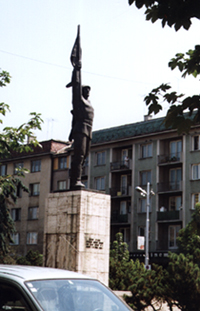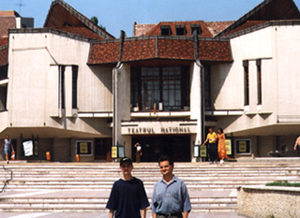

Monday, August 3, 3 p.m.: On the road in a crappy Mexico-level brown van crammed with obnoxious teenage boys, crates of gherkins, potatoes, peppers and soda, and backpacks, all cargo expertly shoved together, including us. For ventilation, we've got only the front windows and a sort of moonroof. It's hot as hell and we're rumbling our way to the OB camp near Sovata, in the heart of the Hungarian-speaking minority region in central Romania.
Hey! I'm in Transylvania and I'm in what I imagine for the moment to be a vintage 1998, Eastern European version of the Merry Pranksters' bus, reliving an adolescence I never had, and feeling like a kid again, at 39. It doesn't quite fit on either count, but at least it's original, and that's why it's such a kick, isn't it?
The boyz borrow my nearly full two-liter bottle of Frutti-Fresh orange soda; after making the rounds, it's returned with about half a mouthful remaining. Well, what did I expect?
Half of my fellow campers wear T-shirts and caps with USA-related logos, especially baseball teams; one skinny kid is in a sleeveless undershirt on which is printed the enlarged face of a US $1 bill. It's a fashion choice I see all over Romania, people exercising their new-found freedom of choice in favor of the Western dream.
Earlier, we'd spent our first morning together as a group getting acquainted with Targu Mures, a dusty town of mixed ethnic Romanians and Hungarians slightly northwest of Romania's center (and the home town of a good number of the campers, most of whom had far less arduous journeys here than I did). Mures -- to which we are introduced on a sort of scavenger hunt -- boasts a fantastic Deco "Palace of Culture" and a weird, Arts and Crafts-like National Theater, not to mention several bulky, prominent statues, including a large, Communist-era rendering of a helmeted soldier raising a flag high -- or is it a rifle? Can't quite tell from the photo I took.
Mures looks less prosperous than a typical Slovene town, but the architecture and ambiance are recognizably Central European. One immediate difference is the very noticeable presence of Roma (gypsies), who are very real in Romania, and have about as bad a reputation as do Serbians in Slovenia or blacks in Connecticut. In Mures, the Roma women provide the brightest -- actually, the only real -- splashes of color, standing in tight knots with their children on street corners, in their long dresses and head scarves; the men favor broad-brimmed black hats, vests and mustaches.

And of course, we meet each other; in the morning, we assemble at an historic fort in town and, after introducing ourselves, stand in a circle and take turns tossing a ball to one another, saying our target's name just before throwing. There are about 18 of us campers; I'm the second-oldest in the group and the only American. Thank God for the 42-year-old Czech businessman, an even-mannered, experienced hiker named Leo who differs from most of us in that he is an adult; everyone else except him and me is a Hungarian or Romanian between the ages of 16 and 25, all but one of whom speaks Hungarian as a first language.
As for Hungarian: what can you say about a language in which the word
for "shower curtain" is "zuhanyozófüggöny"? As any Hungarian speaker
will tell you (if you can understand him), it belongs to the Finno-Ugric
linguistic family and is unrelated to the language of any other European
country except Finland (and even Finnish is as similar to Hungarian as
English is to Russian). Given this background, the conventional
explanation goes, it's no wonder Hungarian speakers have trouble with
other tongues or that they feel rather isolated as a people. On the other
hand, Finnish is just as distant from English as is Hungarian, yet most
educated Finns seem to be quite fluent in English, so maybe this linguistic-
isolation explanation doesn't hold water; maybe it has more to do with
culture, educational opportunities, and whether or not the country has
several decades of prosperous postwar Western European nationhood
under its belt.

All that said, I had an easy time at least in this regard because one of the objectives of the Outward Bound experience was learning English, and dividing Leo (who also didn't speak Hungarian or Romanian) and myself between two groups facilitated forcing the others to speak the alien tongue, which everyone had at least a working knowledge of; some were quite fluent. As for myself, I took the opportunity to learn a few words of Hungarian, and can now successfully count from one to 19, ask for bread, water, cheese or milk, know the words for God, killer, lake, "just a little," "of course," and a few other things, and can tell someone "I love you" or "go to hell." (At the beginning of the camp I was asked for the English name of the blue ankle protectors we wore while hiking and didn't know, so I and the others used the Hungarian name, lapsarviddú. Later I learned the English word is gaiters, but kept on thinking of them as lapsarviddú).
As for my fellow campers: My group included Tivadar (T.V.), an impish, curly-headed natural athlete never out of energy; slender, curly-haired Szilárd and plumpish, intellectual Robert (Robby), both of whom you can see standing in front of the National Theatre in Mures, above right; Ottó, a short, quiet fellow with ears that stuck out, and who suggested the beginnings of a Latin lover in other circumstances; Luci (pron. lou-chee), whom I confused with a guide for a time because of his quiet, capable manner; András, a wiry blond kid who affected toughness but was actually sweet- natured and a good guy; and Adriana, a strapping but shy teenage girl who may have been intimidated by the overwhelming preponderance of men and boys around her. Then there was Zoli (the one with the dollar-bill T- shirt), a skinny, noisy kid with a receding chin and a wispy blond mustache. We soon took a mutual dislike to each other; I think he pegged me as a lazy sod. (Can't please everyone.)
In Leo's group were Orsi, a spirited, very bright 16-year-old girl with a ready smile, who spoke at least four languages (including quite fluent American-accented English) and sported a USA/California baseball cap, and others I got to know less well: Mátyás, Feri, Ernö, Radu. Most of them seemed good kids, reasonably clean-cut, rosy-cheeked teenagers of the type that had long since gone out of fashion in American urban centers.
And the guides, who split their duties between both groups: Attila, the dark-haired, bearded, intense leader, who, perhaps the same as his namesake ancestor, betrayed a crazy glint in his eyes now and then and who, unlike the Hun, sometimes wore a sweatshirt with the English phrase, "Loves passion"; Csongi (pron. TCHON-gi; from his real name, Suba Csongor), a lanky gent with closely cropped hair who had the aspect and manner of a Buddhist monk in mufti, infinitely patient, sweet of voice and temperament, in love with mountains, hiking and nature in general; Danni, a sort of counselor/apprentice guide, all business and initiative; and Örs, a guide who spent most of the time in Leo's group, whom I didn't really get to know (Örs and Zoli, Orsi wrote me later, were both studying at the time to be "computer-men" and already laboring in the cyber-vineyards, as will all of us one day).
And thus, to Sovata.
The following incident happened at some point during the trip. You will forgive me if I don't remember exactly when and where:
While riding in the van with the others, I observe a chicken crossing the road. "Why did the chicken cross the road?" I blurt out, unable to help myself. The others burst out laughing.
"Chicken," says Csongi. "This is a very funny word to us."